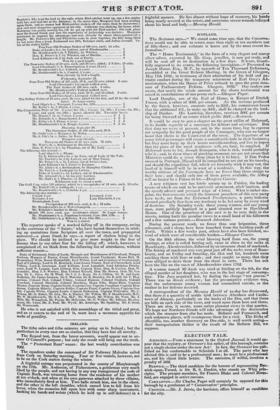SCOTLAND.
The Scotsman says—" We stated some time ago, that the Conserve.: tines would not be able to return more than eight or ten members out of fifty-three ; and our estimate is borne out by the most recent in- formation."
The " Hume Testimonial," in the form of a very elegant and massy- silver salver, executed by Mr. Gray, jeweller, is now got ready, and will be sent off to its destination in a few days. It bears, beauti- fully engraved in its centre, the following inscription—" Presented to Joseph Hume, Esq., M.P., by upwards of Ten Thousand Reformers, assembled at the Great Reform Meeting, in the Green of Glasgow,, May 17th 1832; in testimony of their admiration of his bold and pa- triotic conduct during the temporary retirement of Earl Grey's Ad- ministration, when the House of Peers refused to pass the great mea- sure of Parliamentary Reform. Glasgow, 183-2." Our readers are aware, that nearly the whole amount for the above testimonial was raised in contributions of one penny each.— Glasgow Paper.
Lord Dunglas, son of the Earl of Home, is Keeper of Ettrick Forest, with a salary of 3001. per annum. As the revenue produced by the forest, however, amounts only to 2601., his commission bears that the additional 401., to make up 3001., shall be charged on the lord- ship of Dunbar. His Lordship, therefore, receives 3001. per annum for being Steward of an estate which yields 2601.—Scotsman.
It would be easy to pen a chapter on the great utility of Holyrood, in its double capacity of a sanctuary for debtors and sovereigns. But that duty we wave at present, and i
anti, in the mean time, beg to express our sympathy for the good people of the Canongate, who can no longer boast that theirs is the Court-end of the town. The departure of so many titled personages will create a considerable hole in their business;. but they must keep up their hearts notwithstanding, and live in hopes that the place of the royal wanderers will, ere long, be supplied. If Holyrood were to let, Joseph Bonaparte, who is rich, would probably take it ; and, in these times of pinching economy, we are riot aware that Ministers could do a wiser thing [than let it to him]. It' Don Pedro succeed in Portugal, Miguel will be compelled to set out on his travels; and should the expedition fail, which we fervently wish it may not, the head of it himself will be in want of a residence. In this way, the worthy citizens of the Canongate have no fewer than three stringS to their bow ; and should only one of them prove available, the Abbey- will no longer be a Palace to let.—Dun:fries Courier.
A new religious sect has lately sprung up in Paisley, the leading tenets of which are said to be universal atonement, adult baptism, and the speedy advent and personal reign of Christ. What is rather sin- gular, the first converts which the itinerant preachers of this new party have made, are from the Reformed Presbyterians, a party hitherto deemed peculiarly free from any tendency to be led away by every wind of doctrine. On Saturday week, three young women, and one young' man, were publicly baptized in a pool situated near to Hawkhead. House. One of the preachers of this sect is to be seen daily in the streets, "setting forth his peculiar views to a small band of his followers and a few curious persons.—Greenock Advertiser.
During the present week, no fewer than one brigantine, three schooners, and a sloop, have been launched from the building-yardi of Perth. Within a few weeks past, others have also been finished, se- veral of which were of considerable burden.—Glasgow Courier.
On the 30th ultimo, the wind blowing hard from sea, the young herrings, or what is called herring soil, came in close to the rocks at Rosehearty, Aberdeenshire, followed by.- an immense shoal of mackerel- The fishing of mackerel was very great just off the rocks west of Rose- hearty, and on Friday and Saturday, the 31st and 1st, hundreds were catching them with lines or rods ; and they caught so many, that they were obliged to drive them from the shore in carts. There has not been the like on the coast of Aberdeenshire since 1782.
A woman named M'Ansh was tried at Stirling on the 8th, for the alleged murder of her daughter, who was in the last stage of consump- tion. The Jury acquitted her, by finding the charge "not proven." There was no direct evidence ; but the presumptive evidence was, that the unfortunate young woman had committed suicide, as the mother in her defence asserted.
A correspondent of the Morning Herald of to-day has discovered, that there is a quantity of arable land between Aberdeen and Castle- town of Aboyne, particularly on the banks of the Dee, and that there are hills on each side of the river, and wood upon them here and there. There are also, it seems, some rather pleasant views in that quarter. We hope our Northern friends will take advantage of the discoveries which the stranger from afar has made. Ballater and Pannanich, and such unknown places, will recompense them for a visit. The Birks of Aberfeldie, too, another discovery on Dee-side, is well worth noting-- their transportation thither is the result of the Reform Bill, we suppose.



























 Previous page
Previous page